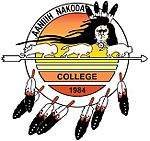Aaniiih Nakoda College facts for kids
 |
|
| Type | Public tribal land-grant community college |
|---|---|
| Established | 1984 |
|
Academic affiliations
|
American Indian Higher Education Consortium American Association of Community Colleges Space-grant |
| President | Sean Chandler |
| Location |
,
,
United States
48°29′04″N 108°45′32″W / 48.48444°N 108.75889°W |
| Campus | Rural |
| Affiliations | Atsina (Gros Ventre) and the Assiniboine |
Aaniiih Nakoda College (ANC), once known as Fort Belknap College, is a special kind of college. It is a public tribal land-grant community college. You can find it on the Fort Belknap Indian Reservation in Harlem, Montana.
This college is unique because it teaches about native culture. It helps students feel proud of their cultural identity. Even though it focuses on native culture, anyone can attend, whether they are tribal members or not. Aaniiih Nakoda College is part of a group called the American Indian Higher Education Consortium (AIHEC). This group helps tribal colleges grow and supports Native American students. ANC was started to help American Indians get a good education after high school. It often serves people in areas where other colleges are far away.
Contents
History of Aaniiih Nakoda College
Aaniiih Nakoda College began in 1984. It was started by leaders from the Fort Belknap Indian Community Council. People from the Fort Belknap Education Department also helped. They wanted their own college because programs off the reservation were not meeting their needs.
Today, the college offers many different learning programs. These include academic studies and training for specific jobs. A big goal of the college is to protect and share the A'anin and Nakoda languages. They also teach about the cultures and histories of these tribes. The college likes to hire talented young people from the community. This helps them develop future leaders from within their own people.
What Can You Study at ANC?
ANC offers different types of degrees and training.
Associate Degrees
Students can earn associate degrees in eleven different subjects. An associate degree is usually a two-year program. It helps students get ready for a job or to continue their studies at a four-year university.
Vocational Training Programs
The college also provides vocational training in five areas. This training helps students learn specific skills for a job. It is part of the Native American Career and Technical Education Program.
Special Programs and Activities
Aaniiih Nakoda College has many interesting programs. These programs help students and the community.
- Fort Belknap Extension Program: This program started in 1998. It is like a demonstration farm where they test new ways to grow crops. It helps local farmers learn about different plants.
- Fort Belknap Tech Department: This department helps with technology needs at the college.
- Global Information Systems (GIS)/ Global Positioning Systems (GPS) Program: Started in 1996, this program teaches about GIS and GPS. GIS helps you map and understand information about places. GPS helps you find exact locations using satellites.
- Natural Resources: This program focuses on managing and protecting the natural environment.
- KGVA 88.1 FM: This is a public radio station. It serves the Fort Belknap Indian Reservation.
- Tribal Colleges & Universities Program (T-CUP): This program helps improve science, technology, engineering, and math (STEM) education. It supports tribal colleges and other Native American-serving schools.
- Basketball: In August 2010, Fort Belknap College helped form the Montana Tribal Colleges Basketball League. The college currently has a men's basketball team.
- Administration for Native Americans (ANA): This program helps Native Americans become more self-sufficient. It also works to preserve their culture through economic growth and technology.
- Head Start Program: This program helps young children from low-income families. It provides early childhood education and other services. Minerva Allen started this program in 1969.
- Teacher Training: This program helps students become teachers. It prepares them to work in schools and educate future generations.
 | Jewel Prestage |
 | Ella Baker |
 | Fannie Lou Hamer |

